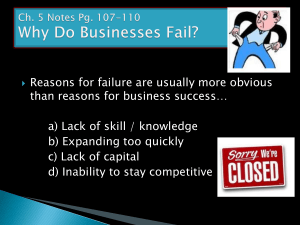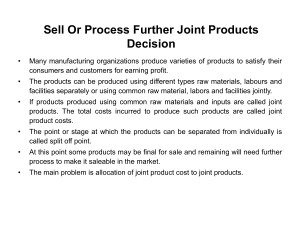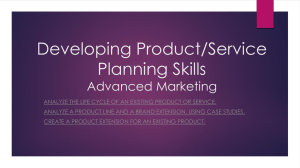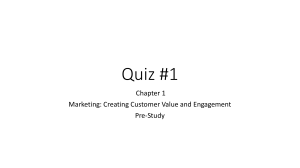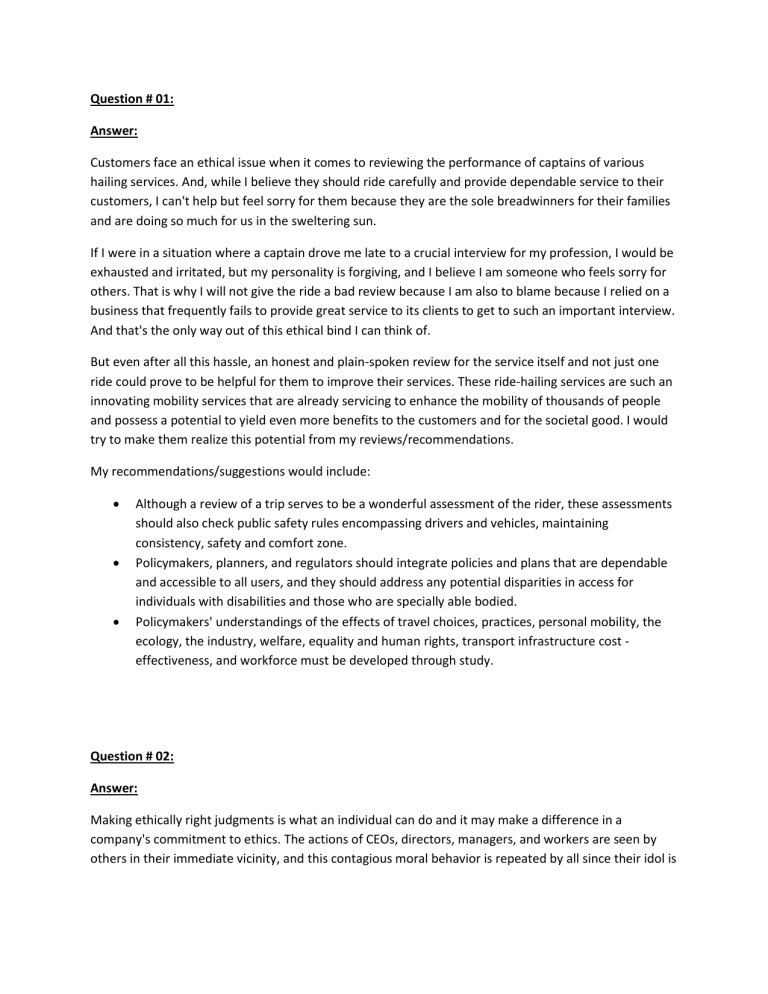
Question # 01: Answer: Customers face an ethical issue when it comes to reviewing the performance of captains of various hailing services. And, while I believe they should ride carefully and provide dependable service to their customers, I can't help but feel sorry for them because they are the sole breadwinners for their families and are doing so much for us in the sweltering sun. If I were in a situation where a captain drove me late to a crucial interview for my profession, I would be exhausted and irritated, but my personality is forgiving, and I believe I am someone who feels sorry for others. That is why I will not give the ride a bad review because I am also to blame because I relied on a business that frequently fails to provide great service to its clients to get to such an important interview. And that's the only way out of this ethical bind I can think of. But even after all this hassle, an honest and plain-spoken review for the service itself and not just one ride could prove to be helpful for them to improve their services. These ride-hailing services are such an innovating mobility services that are already servicing to enhance the mobility of thousands of people and possess a potential to yield even more benefits to the customers and for the societal good. I would try to make them realize this potential from my reviews/recommendations. My recommendations/suggestions would include: Although a review of a trip serves to be a wonderful assessment of the rider, these assessments should also check public safety rules encompassing drivers and vehicles, maintaining consistency, safety and comfort zone. Policymakers, planners, and regulators should integrate policies and plans that are dependable and accessible to all users, and they should address any potential disparities in access for individuals with disabilities and those who are specially able bodied. Policymakers' understandings of the effects of travel choices, practices, personal mobility, the ecology, the industry, welfare, equality and human rights, transport infrastructure cost effectiveness, and workforce must be developed through study. Question # 02: Answer: Making ethically right judgments is what an individual can do and it may make a difference in a company's commitment to ethics. The actions of CEOs, directors, managers, and workers are seen by others in their immediate vicinity, and this contagious moral behavior is repeated by all since their idol is doing it. The actions of one person never go unnoticed and that’s why they are able to bring an organizational change in how other people are committed to morally and ethically sound grounds. The leader's unethical behavior continues to this day in the form of moral disengagement when working in teams owing to difficult performance objectives and other factors, which is adopted by the other members and persistently and constantly shapes an unethical web throughout the business. Inadvertently, this encourages bad conduct and avarice. Goal setting and performance discouragement are closely related, for example, if the work load is high, the employee often tends to misconduct and cheat which reduces his efficiency. Question # 03: Answer: Small businesses are absolutely needed in the country to help expand the economy and reduce unemployment. Grocery stores, pharmacies, fruit and vegetable vendors, book stores, clothes and shoe stores, restaurants, and others are some examples of small businesses. If I had the funds, I would have invested in these businesses. These are small enterprises, yet they are extremely profitable for an individual since they serve a large market. While I feel that no academic qualification or profession is required to run these firms, I also recognise that in order for the business to be highly efficient and profitable, one must work hand-in-hand with technology. Perfect understanding of all applicable regulations, taxation matters, technology, and employee behavior, all work together to make these potentially valuable firms run efficiently and productively. When viewed from the opposing perspective, they have a significant impact on the local economy. They demonstrate that they generate revenue for the government, hence enhancing GDP growth, that they serve customers, that they collect and raise donations for charities, that they work for the common good, and so on. These are some of the reasons why I feel others should invest in these modest but possibly profitable firms, and why I am willing to do so myself. Question # 04: Answer: It would be dreams come true for me to work as an HR Manager for a worldwide corporation. Working for them, I'd be interested in learning where our rivals fall short so that we can encourage our people to work for us rather than the competition since we have a competitive advantage. We would learn exactly what our strengths are and how we might leverage our opportunities to become our strengths by doing a thorough SWOT analysis of both our rivals and ourselves. Along the way, we'd learn about our rivals' flaws and the risks they represent to us. Now is the time to play the psychological game, in which we will analyze our employees' conduct. We will finally win the game by recognizing the needs and wants of the employees and teaching them the difference between the two. By doing so, we want to build a solid business strategy and provide motivation for our workers to stay with us because the benefits they see now while working for our competitors are considerably less than what they may earn in the future if they stay with us. Not every employee is driven by pay benefits, grades, or the work atmosphere; additional elements must be researched to serve as a motivator for them to continue working with us, and that is exactly what our incentive strategy entails. Question # 05: Answer: When it comes to launching a clothing line, the to-do list may seem overwhelming if we are launching in our own country, but when we consider expanding to the international market, particularly the west, the challenges become apparent, but all of these factors vary from person to person and business to business. For example, in the apparel industry, the hurdles we will face are determined by our niche, how we construct a business plan and build a budget, how we structure our firm, how we produce the design and brand, manufacturing, testing, marketing, and scaling up issues, and so on. Despite these difficulties, the most profitable market for us is Qatar, China, Singapore, and other Middle Eastern and Asian nations, owing to their high GDP and per-capita income, as well as their lax norms and regulations. The unemployment rate in these countries is quite low, indicating that people are able to purchase our product as a result of their strong economies. However, the difficulties remain. Even when people have the financial means to purchase our product, the question remains as to why they would do so. The second most difficult obstacle for us is adhering to the various rules/laws of these nations, while promoting our product in a country where people think differently than us remains the most challenging challenge and should be approached with caution. One way I can think of to address these issues is to work with their employees to gain a better understanding of their psychology and how their brains work, and then to brand and manufacture our goods in such a way that it feels unique to them, causing them to want to buy it, ultimately making the product and the company being profitable for the shareholders.
